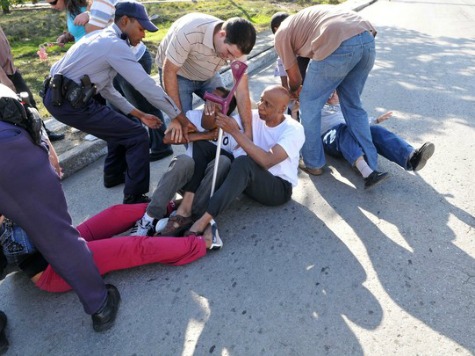The Cuban regime is not opening up to the Western world, nor does it appear much more amenable to respecting universally accepted notions of human rights. According to a new study by the Cuban Commission of Human Rights and National Reconciliation (CCHRNR), May was a record-breaking month in political arrests on the island.
The organization’s report catalogued 1,120 arrests of peaceful political dissidents in Cuba in May 2014, what Infobae is calling “one of the largest numbers in the past decade.” Between six and ten of those arrested were shipped to high-security prisoners, while others were either sentenced to time at standard prisons or released. CCHRNR warns, not only that their numbers are likely to be lower than the actual number of arrests, but that the Cuban government may even exacerbate crackdowns on dissidents in June.
“We are sure that the real figures are even bigger given that we are subject to the most secretive regime of the Western Hemisphere and it is impossible to document all the cases of political repression, much less systematic repression throughout the entire society,” said the CCHRNR in a statement announcing its new report. Incorporating the statistics from previous months, the group has found that political arrests have doubled in 2014.
Among those arrested, notes the report, is human rights crusader, journalist, and Sakharov Prize winner Guillermo Fariñas. Fariñas has subjected himself to 24 hunger strikes, both inside and outside of prison, and visited the United States in 2013 to discuss the oppression of the Castro regime in various talks across the country. Since returning to Cuba, Fariñas has been arrested every Monday for the last 19 weeks, beaten by police officers routinely in the process.
In another example of mass repression of peaceful demonstrators, the Ladies in White, a group of women whose sons, husbands, brothers, and fathers are political prisoners, face routine mass arrests whenever they publicly assemble. This weekend, at least 60 members of the group were arrested for attempting to attend a Catholic mass in western Matanzas and eastern Santiago de Cuba provinces. Religion is still largely repressed in Cuba, and dissidents risk arrests and violence for expressing their Catholicism freely.
In addition to its systematic repression of political dissidents, the Cuban government has been freely harboring terrorists for decades. While the government objected to the United States’ designation of the island as a state sponsor of terrorism this year, Havana continues to host high-ranking officials of the Revolutionary Armed Forces of Colombia (FARC), a universally recognized Marxist terrorist guerrilla group that has ravaged Colombia for half a century. In its latest attack on the country, the FARC broke a ceasefire agreement with President Juan Manuel Santos, agreed upon in Havana during Colombia’s presidential elections.

COMMENTS
Please let us know if you're having issues with commenting.